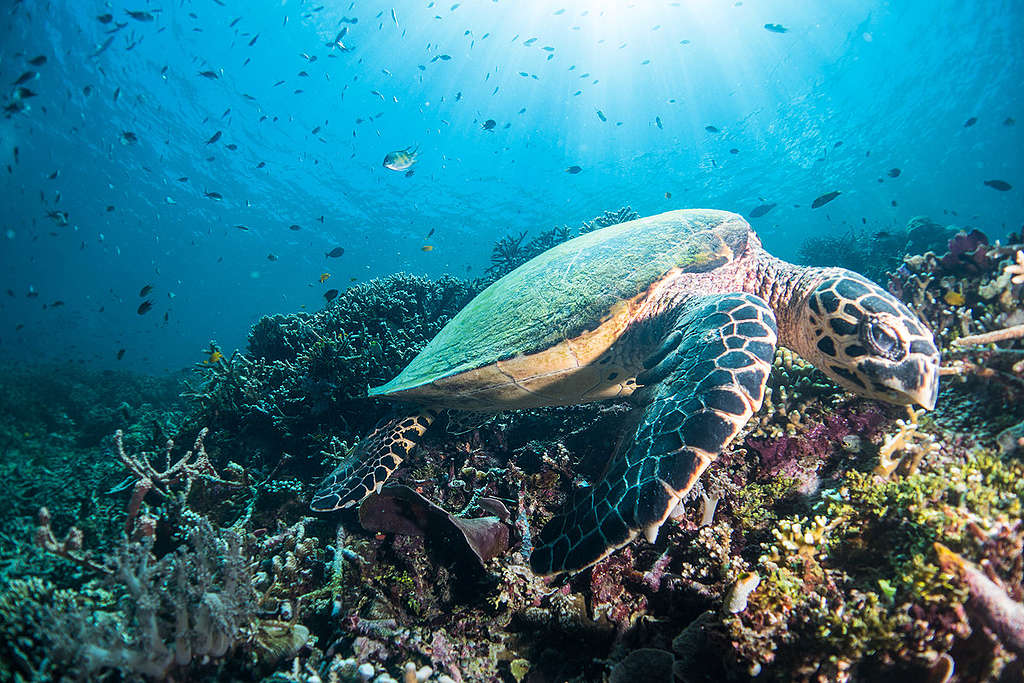Manila — Greenpeace Southeast Asia today released its latest tuna cannery ranking evaluating 23 canneries and brands from the Philippines, Thailand and Indonesia based on their policies on sustainability, transparency and equitability. In the Sea to Can: 2018 Southeast Asia Canned Tuna Ranking Report, only five canneries were identified as overall green performers: Alliance Select Foods International (Philippines), PT International Alliance Foods Indonesia (Indonesia), PT Samudra Mandiri Sentosa (Indonesia), PT Sinar Pure Foods International (Indonesia), and Tops Supermarket (Thailand). [1]
“After three years of proactive engagement, brands and canneries in the region are now more open and collaborative to work with Greenpeace and consumers on fixing their supply chains. But, unfortunately, they are still not transitioning swiftly enough in response to the alarming state of our oceans,” said Ephraim Batungbacal, Regional Oceans Research Coordinator for Greenpeace Southeast Asia.
Tuna continues to be the most economically valuable fish in the world. Southeast Asian countries Thailand, Philippines, Indonesia, and Vietnam are among the top 10 exporters of processed canned tuna, with a combined income of USD 3.016 billion. A total of USD 7 billion worth of canned tuna products was exported in 2017. [2]
The Greenpeace report comes at a time when tuna stocks globally are experiencing intense pressure from destructive fishing practices and overfishing. Illegal, Unreported and Unregulated (IUU) fishing remains rampant in this part of the world. For this reason, the European Union (EU) – one of the biggest importers of tuna from the region – issued a yellow card sanction against Thailand in 2015 and Vietnam in 2017 for failing to combat IUU, which remains in effect pending these countries’ compliance [3].
Greenpeace’s tuna rankings evaluate canneries by checking the company’s performance against a seven-point criteria on their tuna sourcing practices. [4] Companies are strongly encouraged to favor and source tuna from lower-impact fishing methods including pole and line, handline, troll or Fish Aggregating Devices (FAD) free purse seining.
This year, there were notable improvements in the sector, specifically:
- More companies now have tighter policies on traceability and sustainability, resulting in increased procurement of sustainably caught tuna, with 11 companies sourcing using pole and line, and 11 companies sourcing FAD-free purse seine.
- Heightened awareness of issues on slavery at sea and improved measures to avoid inadvertently sourcing tuna associated with human rights and labor abuse.
- Consumers now have access to more product information, with improved labelling at the point of sale for the public to identify the species and how tuna is caught.
- Constructive dialogue with major tuna companies through regular communication.
Despite this, it is important to note that the Philippines and Indonesia continue to catch juvenile Yellowfin and Bigeye tuna at 20-50 cm in length, usually by a fleet of purse seiners. [5] If juvenile fishing is not addressed, this will impact the health condition of tuna stocks and the marine ecosystem.
Some canneries also have a “double standard” approach to product disclosure, exercising more or less stringent rules depending on the country of destination. Greenpeace calls on companies to use the same sourcing standards across the board and make product information available to all consumers regardless of where the product is sold.
“Transparency is key. While we appreciate constructive dialogue with these regional canneries, we would like to see accountability and responsibility from these regional canneries towards consumers here in Southeast Asia. If they have nothing to hide, then a substantial disclosure about their products is necessary,” added Batungbacal.
ENDS
Notes:
[1] From Sea to Can: 2018 Southeast Asia Canned Tuna Ranking https://act.gp/seatocanreport2018
[2] Trade Map. 2018. Trade statistics for international business development. https://www.trademap.org/
[3] European Commission. 2017. Commission warns Vietnam over insufficient action to fight illegal fishing. http://europa.eu/rapid/press-release_IP-17-4064_en.htm
[4] Globally, Greenpeace consistently uses a seven point criteria to rate companies. Each criterion is given weight indicating relevant importance. The criteria include: Sustainability (30%), Sourcing Policy (25%), Traceability (10%), Legality (10%), Driving Change (10%), Equity (7.5%), and Transparency and Customer Information (7.5%).
The overall rating, which is either Good (green), Fair (yellow), or Poor (red), indicates the total score for all seven criteria.
[5] The western and central Pacific tuna fishery: 2016 Overview and status of stocks https://www.wcpfc.int/node/30158
Contacts:
Ephraim Batungbacal, Regional Oceans Research Coordinator for Greenpeace Southeast Asia Email: [email protected] Mobile: +63 917 866 3036
Therese Salvador, Media Campaigner for Greenpeace Southeast Asia
Email: [email protected] Mobile: +63 917 822 8734

The threats facing our oceans are getting more urgent, find out how you can make a difference
